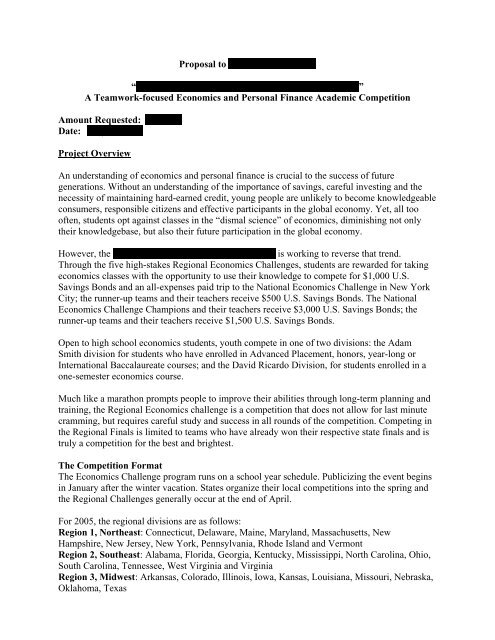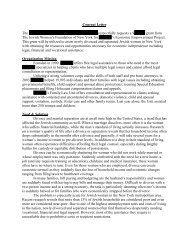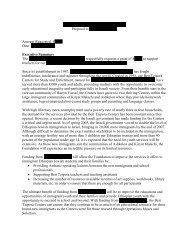Corporate sponsorship proposal for education nonprofit
Corporate sponsorship proposal for education nonprofit
Corporate sponsorship proposal for education nonprofit
Create successful ePaper yourself
Turn your PDF publications into a flip-book with our unique Google optimized e-Paper software.
Proposal to The ING Foundation<br />
“The Regional Economics Challenge presented by ING”<br />
A Teamwork-focused Economics and Personal Finance Academic Competition<br />
Amount Requested: $100,000<br />
Date: May 13, 2004<br />
Project Overview<br />
An understanding of economics and personal finance is crucial to the success of future<br />
generations. Without an understanding of the importance of savings, careful investing and the<br />
necessity of maintaining hard-earned credit, young people are unlikely to become knowledgeable<br />
consumers, responsible citizens and effective participants in the global economy. Yet, all too<br />
often, students opt against classes in the “dismal science” of economics, diminishing not only<br />
their knowledgebase, but also their future participation in the global economy.<br />
However, the National Council on Economic Education is working to reverse that trend.<br />
Through the five high-stakes Regional Economics Challenges, students are rewarded <strong>for</strong> taking<br />
economics classes with the opportunity to use their knowledge to compete <strong>for</strong> $1,000 U.S.<br />
Savings Bonds and an all-expenses paid trip to the National Economics Challenge in New York<br />
City; the runner-up teams and their teachers receive $500 U.S. Savings Bonds. The National<br />
Economics Challenge Champions and their teachers receive $3,000 U.S. Savings Bonds; the<br />
runner-up teams and their teachers receive $1,500 U.S. Savings Bonds.<br />
Open to high school economics students, youth compete in one of two divisions: the Adam<br />
Smith division <strong>for</strong> students who have enrolled in Advanced Placement, honors, year-long or<br />
International Baccalaureate courses; and the David Ricardo Division, <strong>for</strong> students enrolled in a<br />
one-semester economics course.<br />
Much like a marathon prompts people to improve their abilities through long-term planning and<br />
training, the Regional Economics challenge is a competition that does not allow <strong>for</strong> last minute<br />
cramming, but requires careful study and success in all rounds of the competition. Competing in<br />
the Regional Finals is limited to teams who have already won their respective state finals and is<br />
truly a competition <strong>for</strong> the best and brightest.<br />
The Competition Format<br />
The Economics Challenge program runs on a school year schedule. Publicizing the event begins<br />
in January after the winter vacation. States organize their local competitions into the spring and<br />
the Regional Challenges generally occur at the end of April.<br />
For 2005, the regional divisions are as follows:<br />
Region 1, Northeast: Connecticut, Delaware, Maine, Maryland, Massachusetts, New<br />
Hampshire, New Jersey, New York, Pennsylvania, Rhode Island and Vermont<br />
Region 2, Southeast: Alabama, Florida, Georgia, Kentucky, Mississippi, North Carolina, Ohio,<br />
South Carolina, Tennessee, West Virginia and Virginia<br />
Region 3, Midwest: Arkansas, Colorado, Illinois, Iowa, Kansas, Louisiana, Missouri, Nebraska,<br />
Oklahoma, Texas
Region 4, Northwest: Indiana, Michigan, Minnesota, Montana, North Dakota, South Dakota,<br />
Wisconsin and Wyoming<br />
Region 5, West: Alaska, Arizona, Cali<strong>for</strong>nia, Hawaii, Idaho, Nevada, New Mexico, Oregon,<br />
Utah and Washington<br />
The event itself offers a balanced mix of both teamwork and individual competition. Working<br />
individually, students compete through two rounds of written questions on macro and<br />
microeconomics and then work together in their teams to answer written multiple-choice<br />
questions on current events, financial literacy, and economic history and theory. Their hard work<br />
culminates in a teamwork-focused Quiz Bowl round with multiple-choice questions on current<br />
events, economic theory and personal economics.<br />
Although teamwork is often emphasized in group sports, the less physically gifted and more<br />
academic students are generally left out of such lessons. The Economics Challenge teaches these<br />
youth the importance of teamwork in the quest <strong>for</strong> the correct answer and in the challenge of<br />
working with others to answer complex economics and personal finance questions.<br />
Public Relations and Branding Strategy<br />
We propose to work closely with ING to determine ideal communities <strong>for</strong> hosting the five<br />
Regional Challenges. Each community will be chosen based on the strengths and capacity of the<br />
NCEE-affiliated State Councils and Centers; the diversity of its population, the extensiveness of<br />
its media outlets and proximity to local ING offices or headquarters. Possible locations include:<br />
Northeast: New York, Hart<strong>for</strong>d, CT or West Chester, PA<br />
Southeast: Atlanta, GA or Nashville, TN<br />
Midwest: Denver, CO; Des Moines, IA or St. Louis, MO<br />
Northwest: Minneapolis, MN or Detroit, MI<br />
West: Scottsdale, AZ or Los Angeles, CA<br />
With five branded Regional Challenges, the opportunities <strong>for</strong> publicity and branding are virtually<br />
limitless. The NCEE will pursue an aggressive public relations strategy aimed at publicizing the<br />
Regional Challenge at the local, state and regional levels through a campaign of press releases<br />
and personal media contacts. Unlike one-shot events, having five Regional Challenges offers the<br />
impressive benefit of multiple market branding, ensuring the ability to obtain media attention in<br />
both small and large markets and receive national exposure. The Regional Challenge will be<br />
publicized in cities and towns as youth compete in their State competitions and again as State<br />
winners continue onto the Regional competition. Additionally, the NCEE’s unique nationwide<br />
network of more than 200 affiliated State Councils and University-based Centers <strong>for</strong> Economic<br />
Education ensures that aggressive marketing can and will occur in otherwise difficult to<br />
approach markets.<br />
With the approval of ING, the NCEE would like to publicly announce and honor the Regional<br />
Economics Challenge partnership by hosting the inaugural NCEE/ ING Regional Economics<br />
Challenge in Atlanta, possibly at the ING Headquarters. “Kicking-off” the Regional Challenges<br />
with the Atlanta site will guarantee publicity not only <strong>for</strong> the announcement of the <strong>sponsorship</strong> in<br />
the media, but also attention to the actual event and ING’s support of <strong>education</strong>al excellence.<br />
The NCEE would ask that senior executives from ING participate in the event either by
emceeing one of the Quiz-bowl rounds or by participating in the awarding of the Southeast<br />
Regional Championship.<br />
In anticipation of the announcement, a detailed event strategy will be developed to generate as<br />
much local press coverage as possible, both in print and on television <strong>for</strong> all five regions. The<br />
ING logo will be included on all printable materials related to the Regional Challenge, including<br />
the fliers, advertisements, press releases and all signs. At the Regional Challenges, ING<br />
promotional items, including t-shirts and caps, can be offered as premiums to students and<br />
teachers who attend the competition.<br />
For action photography of the quiz bowl aspect of the competition, the NCEE will ensure the<br />
ING logo is prominently displayed behind the emcee and participants. Mention of ING’s support<br />
will also be highlighted in articles in the quarterly NCEE newsletter as well as in our on-line<br />
annual report and links to the ING website from the NCEE webpage will also be posted.<br />
In the past NCEE has employed a very successful high-impact public relations campaign <strong>for</strong> the<br />
National Economics Challenge. Media coverage last year included CBS Marketwatch, CNNfn,<br />
PBS “Right on the Money;” and more than five dozen hits in local markets. For any and all press<br />
generated by the Regional Economics Challenges in 2005, ING would be mentioned as a<br />
sponsor. Additionally, with a targeted media campaign, we only expect publicity to increase.<br />
Volunteer opportunities <strong>for</strong> ING employees are numerous with this event. Employees could offer<br />
to tutor or mentor competing students, help with the supervision of the participants on the day of<br />
the competition, assist with the judging and announce the award winners. Hosting the<br />
competitions in cities and towns with a strong ING volunteer team presence can also be arranged<br />
in order to ensure active ING involvement.<br />
Evaluation & Impact<br />
In the past four years, the Economics Challenge has grown and attracted increased media<br />
attention and student involvement. In 2001, 1400 students from 188 high schools in 22 states<br />
competed <strong>for</strong> the National Championship. By the 2003 competition, involvement had increased<br />
by more than 157% to 3600 students on over 900 teams from 28 states. As the competition enters<br />
its fifth year, more than 4500 youth from 35 states are expected to participate.<br />
NCEE: The Nation’s Leading Service Provider and Advocate <strong>for</strong> Economic Literacy<br />
The National Council on Economic Education was founded as an independent, nonpartisan,<br />
<strong>nonprofit</strong> organization 55 years ago by business leaders and educators who saw the need to<br />
improve economic and personal finance <strong>education</strong> in the nation’s schools. NCEE’s mission is to<br />
help all students develop the real-life skills they need to succeed: to be able to think and choose<br />
as knowledgeable consumers, savers and investors, responsible citizens, productive members of<br />
the work<strong>for</strong>ce, and effective participants in a global economy.<br />
To this end, NCEE conducts three core programs: EconomicsAmerica <strong>for</strong> the nation’s schools;<br />
EconomicsInternational <strong>for</strong> teacher training in other countries; and EconomicsExchange <strong>for</strong><br />
lifelong learning. Within its EconomicsAmerica program, NCEE’s primary goal is to get sound<br />
economics and personal financial decision-making skills taught effectively and well throughout<br />
the K-12 curriculum. NCEE develops and publishes print and Web-based, classroom-tested,
standards-based instructional materials <strong>for</strong> every grade level. The Economics Challenge<br />
competition allows students to show their mastery of the EconomicsAmerica material.<br />
There are several key factors that differentiate NCEE from most other economic and financial<br />
<strong>education</strong> organizations. The first and most important is our highly effective, nationwide<br />
network of affiliated State Councils and over 200 University-based Centers <strong>for</strong> Economic<br />
Education. This distribution system is the way we get our <strong>education</strong>al programs into the hands,<br />
and heads, of thousands of teachers and millions of students each year. This model is particularly<br />
effective <strong>for</strong> increasing the number of students who participate in the Economics Challenge each<br />
year and in offering members of the media easy access to local spokespeople.<br />
The second key factor is our teacher training model. We strongly believe that the best way to<br />
educate students is by training the teachers to effectively teach the students. The emphasis on<br />
teacher training takes advantage of a powerful multiplier effect. Through each teacher trained,<br />
NCEE programs reach an average of 150 students per year at the high school level. Again, by<br />
reaching out to teachers, the NCEE is able to increase participation in the Economics Challenge<br />
and establish a large contingency of supporters <strong>for</strong> the program.<br />
NCEE is also an exceptional steward of both public and private resources, and has a strong track<br />
record in the area of administrative and financial soundness, as evidence by a strong governance<br />
structure at the Board of Directors level; a long record of receiving unqualified opinions from<br />
independent auditors; strong managerial and internal controls in terms of financial and<br />
administrative checks and balances; and a low administrative-and-fundraising/total expense<br />
ratio. In 2002 and 2001 (the most recent years <strong>for</strong> which audited results are available), this ratio<br />
stood at 17.6% and 20%, respectively, considerably below industry standards.<br />
NCEE benefits from stable and dynamic leadership, at the Board and Executive staff level.<br />
Serving as President and Chief Executive Officer <strong>for</strong> the NCEE is Dr. Robert F. Duvall, who<br />
came to NCEE in the spring of 1995. Prior to joining NCEE, he was President of Pacific<br />
University in Oregon <strong>for</strong> twelve years. Under his strong and strategic leadership NCEE has<br />
grown as the preeminent national organization promoting economic and financial literacy.<br />
Under Dr. Duvall’s direction, revenues <strong>for</strong> NCEE’s pace-setting programs in economic and<br />
financial literacy have increased 300% from 1995 to 2003. Dr. Duvall has become a national,<br />
and international, spokesman <strong>for</strong> the cause of improving economic and financial <strong>education</strong>, as a<br />
core component of the K-12 curriculum. Since 1995, he has represented the interests of NCEE<br />
and our corporate partners eloquently and enthusiastically. Dr. Duvall is always personally<br />
involved in the Economics Challenge and attends both State, Regional and National<br />
competitions.




